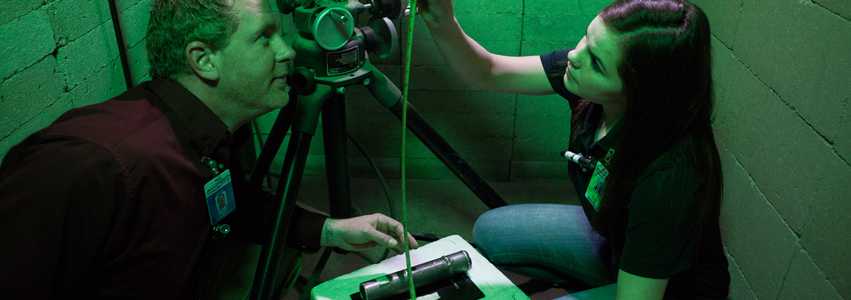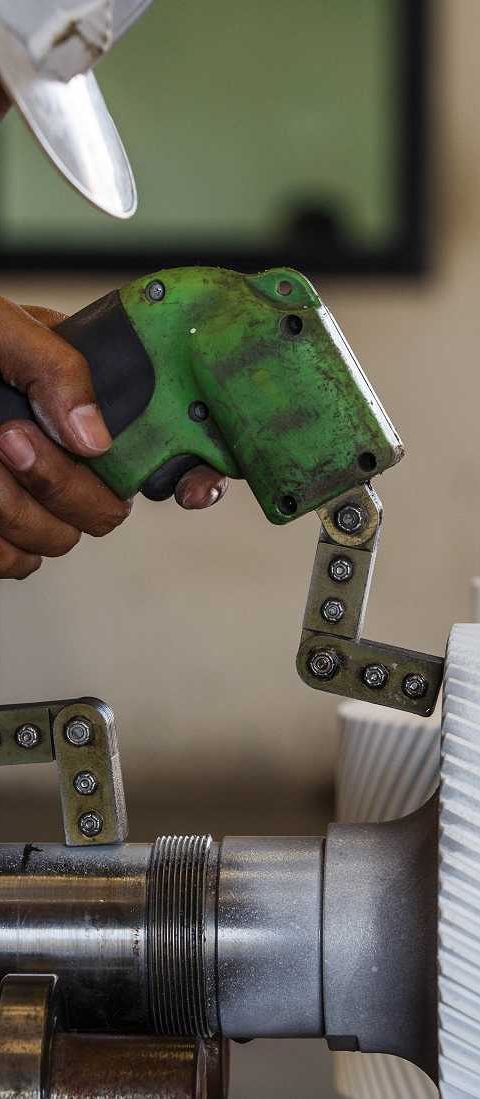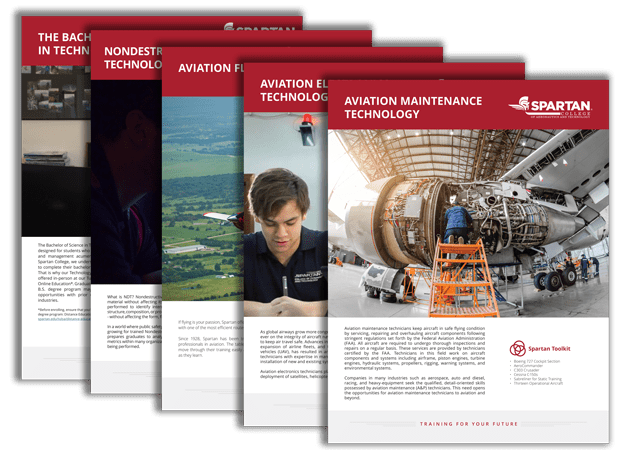Nondestructive Testing Technology ( NDT ) & Quality Control Management

Training the Next Generation of Nondestructive Testing Technicians
Interested in Learning More?

Program Details
Nondestructive Testing Technology (Diploma) | 10 Months
Students learn to operate equipment used in making magnetic particle and liquid dye penetrant inspections. They also learn the basic principles of radiation safety, metallurgy, ultrasonic inspection, eddy current, leak detection, codes, and standards. Students also process and interpret film using x-ray equipment. These sophisticated techniques are used to inspect or locate potential hazards in products, parts, welds, or other critical areas requiring investigation. These tests are performed without destroying the use of the part or product while determining its safety.
One of our quickest programs to complete, students can finish the NDT testing program in as few as 10 months, then apply to complete their degree in quality control management in an additional 5 months.
Quality Control Management (Associate of Applied Science) | 15 Months
Train in quality control management and nondestructive testing methods, where you learn to examine whether all products or parts being examined are constructed or repaired in accordance with approved procedures and specifications. NDT testing methods, as quality assurance management tools, can be used to help with cost reduction, accident prevention, and improvement of product reliability, all of which are key critical areas of importance to any company. The associate courses in quality control management provide additional technical training in the specialty, as well as general education courses focused on interpersonal skills such as oral and written communication, customer service and diversity in the workplace.
NDT and quality control measures are critical to the daily functions of many companies. These tests and analytical procedures are necessary to ensure safety and reliability for a company, its people, and its products. Motor vehicles, aircraft, bridges, power stations, trains, pipelines, oil platforms, and refineries are all inspected using Nondestructive testing methods.
NDT and Quality Control methods are used in a variety of industries including:
- Aerospace
- Aviation
- Construction
- Manufacturing
- Amusements Parks
- Railroads

PREPARE FOR TAKEOFF BY GETTING A LAY OF THE LAND
Course Work
WHAT EQUIPMENT DOES OUR SCHOOL HAVE TO OFFER?
CALIPER MICROMETERS
CALIPER MICROMETERS
X-RAY TUBES, FILM VIEWING/ INTERPRETATION AND DIGITAL IMAGING EQUIPMENT
X-RAY TUBES, FILM VIEWING/ INTERPRETATION AND DIGITAL IMAGING EQUIPMENT
PENETRANT DYES AND DEVELOPERS
PENETRANT DYES AND DEVELOPERS
ULTRASONIC TESTERS AND ASSORTED TRANSDUCERS
ULTRASONIC TESTERS AND ASSORTED TRANSDUCERS
EDDY CURRENT TESTER AND ASSORTED PROBES FOR ET
EDDY CURRENT TESTER AND ASSORTED PROBES FOR ET
Industry Outlook
- Ability to plan, prepare and set-up equipment and examine the system(s) to locate and identify cracks or other defects.
- Supervise and train lower level personnel in reporting and in evaluating the validity and acceptability of the inspection, examination and / or test results.
- Determines and calibrates test equipment settings according to type of inspection being performed using standard practice and manual instructions as required.
- Inventory equipment ensuring job ready status after each job and perform preventative maintenance on all service equipment.
- Ensures all documents relating to a job are prepared and processed according to established procedures.
- Answers questions and provides information related to projects including resolving problems, handling complaints and providing technical expertise in area of assignment.
- Adhere to Employee's Responsibilities section set forth in Conco's Safety Policies & Procedure Manual.
- Inspect products to ensure that they meet quality standards.
- Create tests for quality control of products.
- Disassemble product parts to inspect them individually.
- Monitor production operations to ensure conformance to company specifications.
- Direct assembly adjustments to ensure operations reflect quality standards.
- Ensure products meet customer expectations based on company objectives.
- Communicate the results of inspections and put forward corrective suggestions.
- Write reports to document deficiencies and errors of products.
- Performs inspection in accordance with approved work instructions.
- Immerses or sprays ferrous magnetic metal parts with iron oxide solution.
- Positions parts between contacts of magnetic testing equipment and activates switch to induce magnetic field that attracts and accumulates iron oxide particles at defective points.
- Examines parts under fluorescent or black lighting to detect indications at or near part surfaces indicated by thick deposits of iron oxide particles. Evaluates indications against acceptance criteria to determine if they are defects.
- Removes surface defects by grinding or marks part defects for repair or scrap depending on nature and extent of defects.
- Moves heavy parts by using forklifts and cranes.
- Generates test reports, certifications and deviation reports as needed.
- Perform surface inspections with dye penetrant materials.
- Interpret and evaluate results on a range of different weldments, castings, forgings, and materials produced from different methods.
- Perform volumetric NDE inspections with advanced ultrasonic immersion machines.
- Perform volumetric NDE inspections with longitudinal wave and shear wave hand scan techniques.
- Perform visual inspections.
- Communicate and report findings to production & engineering.
- Interpret and review engineering drawings as required.
- Support the development of NDE inspection techniques for complex geometries.
- Assist in training and developing others within the team.
- Support research and development in to system qualification and certification for critical processes.
- Perform radiographic inspections to ASME, ANSI, AWS and API related codes and standards.
- Experience shooting and viewing casings, forgings, piping, etc.
- Evaluate and interpret results per code of construction and/or customer requirements.
- Prepare inspection/examination reports in a timely and accurate manner.
- Maintain responsibility in security and control of radiographic equipment in accordance with federal/state/local requirements.
- Provide support and on-the-job training to all assistant radiographers, trainees.
- Perform radiographic operations including selection of appropriate techniques, positioning of materials, exposure of film, etc. to identify and assess defects in castings and weldments.
- Perform all darkroom procedures to develop film.
- Interpretation of film results to determine whether parts pass or fail inspection based on knowledge of defect seriousness, codes, standards and customer specifications.
- Prepare necessary documentation of inspection process.
- Move parts by hand and using forklifts, hoists and other lifting equipment, to facilitate inspection.
- Review new customer orders to help determine proper processing through X-Ray operations.
Sample Classes
Students will learn the various materials and processes associated with metallurgy. Students will learn Level I and Level II theory for the VT inspection method. They will attain a working knowledge in the navigation and application of various industry codes and standards as they apply to VT.
Students will learn Level I and Level II theory for Liquid Penetrant Testing (PT) and Magnetic Particle Testing (MT) inspection methods. They will attain a working knowledge in the navigation and application of various industry codes and standards as they apply to the Core Methods.
Students will learn Level I theory for the UT inspection method. They will attain a working knowledge in the navigation and application of various industry codes and standards as they apply to different ultrasonic inspection techniques.
FAQ's
Being able to prove that you’ve graduated from high school or have earned your GED, is the first step. See our College Catalog for more information.
At the end of the day, NDT training is an integral part of QC training. It’s a tool used for both quality control and quality assurance practices. QCM puts a larger emphasis and focuses on the quality management aspect of the industry.
Great question, Spartan’s have gone to work in roles like:
- Quality Control Inspector
- Eddy Current Technician
- Magnetic Particle Technician
- Ultrasonic Testing Technician
- Industrial Radiographer
- Industrial Radiographer Assistant
While we offer scholarships and financial aid to those who are eligible, you can find the full breakdown in our up-to-date Catalog Supplement guide.
NDT students practice on real aircraft, piping, welds, and anything that needs to be inspected.
You’ll take a variety of classes, including Visual Testing, Core Nondestructive Testing, Introduction to Nondestructive Testing, and more.
You’ll learn about the quality management, ISO 9000, total quality tools and techniques when it comes to working with technology.
Yes, like most higher education and trade schools, we incorporate general education classes that are important to the specific program you’re studying at Spartan College.
We have fixed class schedules. Schedules are reserved on a first-come, first-served basis and class schedules vary for each class start date. Don’t worry, most Spartan students find program schedules to fit into their busy lifestyle.
Roughly 50/50 hands-on learning and classroom learning.
There are no certifications that result from the education you’ll gain at Spartan, but it’s part of the requirement for working in the NDT industry. To take the certification test, students need to have certain amount of experience hours. Typically, once students gain employment in the industry, their job will ensure they take the three-part test: theory test, practical test, and specification test that they need to start fully working independently in their role.
Normally, NDT graduates will gain an in-house certification once they’re employed and pass the three exams, theory test, practical test, and specification test. These costs are typically paid for by the employer, if not they are out of pocket.
No, internships are not part of the program. However, after gaining your first job, you’ll find you’ll usually enter the workforce as an apprentice.
Find out for yourself. Hear from recent Spartan NDT & QCM graduates from the Tulsa, OK campus.
You probably have a lot of questions about college. If you don’t find the answers you need on these pages, just call 918-831-8688 to speak with an admissions representative.